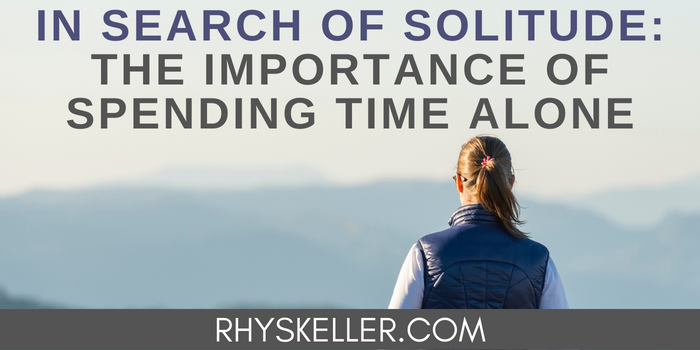It’s been said that all man’s miseries originate from being unable to sit alone. As children, we are punished with time outs. Parents often don’t like teenagers staying home alone. Prisoners who don’t follow the rules are sent to solitary confinement, a consequence known to break even the most hardened minds among us. We believe solitude is an enemy and being alone is a sign of failure. Failure in life, failure in relationships, and even failure in performance. In many ways, we confuse aloneness with loneliness. But this isn’t true. Spending time alone through intentional solitude can be a game changer in helping us push through life’s roadblocks.
When you buy through my links, I may earn money from my affiliate partners. Learn more.
Why are so many people afraid of solitude?
All of us are designed for relationship and community.
It’s one reason time outs work so well in disciplining young children.
In our home, we use gentle timeouts sometimes in the same room as us or in a nearby room.
It’s amazing to see how quickly a child wants to return to the group and be around people, or at the very least be able to go back to doing what the want.
But many people fear solitude and I believe the reason is intentionality and choice.
When solitude is not by choice, feelings of exclusion, loneliness, boredom, fear, regret, embarrassment, negative self talk, and even shame are nearby.
These feelings can be powerful and damaging if left unchecked.
Intentional solitude by choice, however, can also be a powerful force for good.
Benefits of Solitude
Intentional solitude, and even unintentional solitude when embraced through a positive mindset, can be a stimulant for success in:
- Achieving a higher level of performance
- Increasing focus to obtain a goal
- Removing distractions
- Discovering our desires, strengths, and weaknesses
- Testing our mental limits to find weak areas
- Resetting social dependencies
- Escaping the many negative effects of social media scrolling influences
- Relaxing over stimulated dopamine generators
- Increasing desire for real social connections
- Discovering who our true friends are that pursue us when we withdraw
- Clearing our heads and calming our minds
- Creates space to draw near to God with our complete selves
How to Embrace Solitude
Embracing solitude is not as difficult as we often think.
We don’t need to become monks or even dedicate hours each day to being alone.
To reap the benefits of intentional solitude, we simply need to create time and space.
Starting small is a great way to experiment and see some immediate benefits.
Today and each day this week, set 15 minutes aside in your calendar at a time where the demands on you are minimal.
For many, the best time will be first thing in the morning when other family members are still sleeping.
Or, if you have school aged children and a spouse that works outside of the home, solitude during the middle of the day might work best.
In these special 15 minutes, remove distractions from your space to include phone and TV.
Focusing your mind is hard enough without any distractions so the more you can eliminate from your space of solitude the better.
Many would call this time of solitude meditation, but that carries many religious and secular connotations.
Meditation is also a focused effort on mind and thought work, which is just a type of effort solitude can be used for.
This 15 minutes of intentional solitude is simply a time of withdrawing from things on purpose so that you can focus on one thing for success.
Before you enter into this time of solitude, be thinking about what one thing, if you were able to work on it, get better at it, or finish it, would have a wonderful effect on your life.
Once you have that one thing, spend your time of solitude completely focused on it.
How do I get the most from my alone time?
Here’s how I get the most from my alone time and maybe you can draw some parallels in your own life for application.
I’m a husband and father of three little ones.
I work a pretty typically 8-5, which is really a 7:30am – 5:30pm when you factor in commuting.
Kids usually get to sleep around 8:30pm and I like to be asleep by 10:30pm.
Having time alone can be pretty difficult given the circumstances because I love my wife and kids.
I rather be with them then withdraw while they’re awake.
So for me, the best time to have intentional solitude is when everyone is sleeping early in the morning.
I’ve been waking up around 4:30am for over a decade.
Since my kids don’t usually wake up until 5:30am or 6:00am, and my wife prefers to get as much sleep as humanly possible, this schedule provides me a pretty consistent one to two hours of uninterrupted solitude.
This timeframe is when I workout, read, have quiet time with God, write, or take care of little to-do list times.
To make the time more enjoyable and much less of chore, I typically enjoy a caffeinated beverage (ZOA Energy Drinks are my current go-to favorite) to kick it off and then I get right to work.
My phone and in the past, video games, have been huge distractions for me.
To counter this when necessary, I’ll place my phone in a different room for charging so I can’t even see it.
What Solitude brought to my life?
I found long ago that intentional solitude to focus on things that are important to me were a game changer in feeling content and satisfied in life.
On days when I don’t spend time alone, I’ll feel like a rat stuck in a wheel just running as fast as I can focusing on other people and typically other fires each day brings.
Waking up early and having time alone has allowed me to focus on things I care about, take care of myself physically and spiritually, have a little fun like finishing a movie from the night before or playing a video game before a stressful day, and writing thoughtful content.
As an engaged husband, father, and worker, it’s difficult finding or making time to write.
And I love to write.
Solitude gives me the mental clarity and physical energy to put thoughts to words and words to paper (or the proverbial digital paper that is).
Also, and maybe most importantly, focusing on myself and my interests early in the day helps me focus on other people throughout the day.
As a Supporter of Other People’s Mental Health
Reading this content has already separated you from the masses.
You now know intentional solitude is important and leveraging it can make us and others far more successful in life.
But that also means you are aware and responsible to help cultivate this in other people.
You may be like me, in that your spouse or significant other also expresses a desire and need to recharge, relax, and re-focus through intentional solitude.
It’s for our own benefit, and theirs, to help them.
When we see someone else running out of juice or dealing with roadblocks and setbacks in life, we can encourage them to break through those barriers with intentional solitude.
Let’s help them create space and time to relax and focus on what they need most.
I challenge you to spend time alone intentionally
Give it a try if you haven’t incorporated time alone into your schedule already.
Just start with 15 minutes a day for a week.
If it makes your life better, make it 30 or 60 minutes.
Really carve out that time to make it a focused, dedicated space to tackle what’s most important in your life.
Disclaimer
Remember, intentional solitude is not the same thing as being lonely.
If you are lonely, it’s important to reach out to a professional for help.
Find a counselor, a pastor, or a trusted friend to be vulnerable and open to.
We were designed by God for relationship and community.
If this content spoke to you, consider 3 things:
- Leave a comment below and tell me what you think about intentional solitude. Do you make time for it in your day or not? What has solitude done for you?
- Subscribe to my newsletter so you get more content just like this delivered right to you. I hate spam too, so I’ve made my newsletter a 1-click unsubscribe at any time you change your mind. Encouragement and insight will be in your inbox for FREE!
- Share this message with your social network, friends, or family. All of us can become better at creating space for intentional solitude in our busy schedules.



